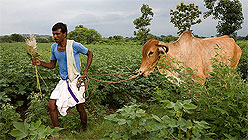Let’s abandon, once and for all, the childish delusion that documentaries are, or should be, objective. Would you spend three to five years of your life making a film about a subject you didn’t feel strongly about? Of course not. And if you felt that strongly about a given issue or situation, you’d naturally want to shift the perceptions and attitudes of those less informed. Viewed from this angle, objectivity is a myth and “balance” is a feint whose goal isn’t fairness so much as lowering the viewer’s guard.
I don’t mean to sound cynical; I’m just tired of those who decry Michael Moore (to cite the prime example) for overt and politicized activism while missing the more subtle but equally impassioned activism practiced by the great majority of doc makers. Every doc has a point of view, people. If you can’t detect it, you’re not paying close enough attention.

I’m afraid I’ve now poisoned the well (a debating term) with respect to Bitter Seeds, local filmmaker Micha Peled’s deliberately and precisely infuriating dispatch from India. (Not that he would disagree with anything I’ve said, mind you.) This is an important film, and for most Americans a prescient film, and it assuredly takes us to a place and immerses us in a way of life we would not have access to other than through the extraordinary commitment of independent filmmakers. But it’s also a film constructed and calculated to have a specific effect on viewers.
The problem that initially caught Peled’s attention was an epidemic of farmer suicides in India’s cotton-growing region in the last decade. The farmers, whose families have worked the land for generations, had certainly endured droughts, pestilence and low crop prices in the past without being forced over the cliff. What was different now?




